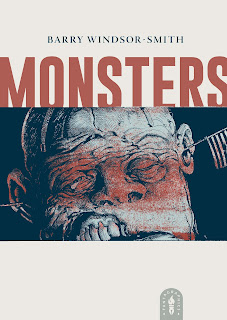Monsters is a massive graphic novel written and illustrated by Barry Windsor-Smith; he apparently has been working on it, off and on, for thirty-five years. (I didn't hear a word about it until it was published; I'm not clear if he worked on it quietly the whole time or if he had mentioned it and I just never heard.) It aims to be a serious book, but it has an inherent pulpiness that drags it back down over and over again, and a loose-limbed structure that introduces its own issues.
For most potential readers, the big point is that it contains over three hundred and sixty pages of BWS art, some of those among the best in his career. It's all also entirely in his mature style; there's no visual indication in this book that it took four decades to make. So this is a visually stunning book: BWS has been a great craftsman of comics pages for about fifty years now (counting from his game-changing stint on Conan), and this is a major, major milestone in any appreciation or evaluation of his career.
The story though, does feel like a lightly warmed-over Hulk story. There's a monster: gigantic, almost indestructible, mentally tormented, uncommunicative. There are evil scientists (some of them, inevitably, Nazis) and almost-as-evil military types. There's abuse from a father in the past. There's an escape, under gunfire, from a military base, the monster hiding out with a helper in an isolated house with military choppers angrily buzzing overhead, and a shoved-in "power of public opinion" moment that nearly gets lost.
There's also a major thread about supernatural powers, which are not terribly well defined and seem to be able to do whatever the story needs them to do. (Not to save their owners from death, admittedly, but being dead doesn't slow possessors of "the shine" anyway.)
It's all told in more-or-less straightforward comics, but it's not particularly well-structured for the length. All of these pages, all of these moments, could have formed a stronger story if corralled somewhat more tightly, reorganized a bit, and if BWS or an editor had imposed a stronger structure on the story. (This, though, would have meant redrawing or reworking some number of pages - probably including some from thirty years before. That may have not been plausible.)
Instead, the story meanders, telling us one thing and then another, adding layers and depths as it goes - but in a fashion that leads this reader to suspect it happened as BWS worked on the pages, and that he didn't go back to integrate his new ideas into old pages. One particularly egregious example: one character barges in, declaring that he's the Governor of this state, and is accepted as such....but he admits, a hundred pages later, that he was just pretending. Now, in this world, the Governor of a state is a public figure, and everyone knows who that guy is. So this is just not a ruse that can actually work.
The Nazi, who is basically the main villain, is unavailable for the big ending, so he gets understudied by a military guy - who, humorously to me, is actually named Ross, as if that was the only word remaining from the Hulk pitch.
It's all set in the late '40s (mostly 1949) and 1964-65, but only the furniture (cars, hairstyles, WWII uniforms) makes it feel like a period story. I suspect there are multiple expressions used in dialog that are anachronistic; this feels like a contemporary story told in a different time to make the Nazi/WWII connection make sense.
All in all, this has pretty much exactly the strengths and weaknesses of a book that a respected but idiosyncratic creator worked on quietly and alone for decades: it looks great, it has a lot of good ideas and moments, the characterization is excellent. But it's also lumpy, with a structure that feels like a sequence of pages in the order that the creator thought of them rather than the order that would best serve the story, and later revelations that are not adequately set up. It's good, but you can see the better book that it should have been.

No comments:
Post a Comment